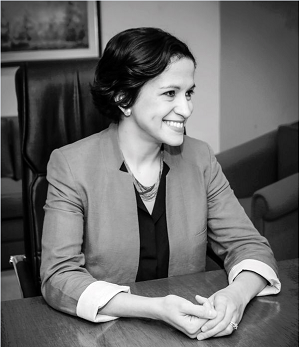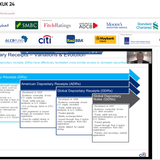Q.Can you give us a sense of the economic outlook for Paraguay in over the next 6-12 months? What are some of the most influential factors in play?
A. Growth prospects for this year are auspicious and the economy is expected to continue growing at around 4.2%. The levels of foreign trade have recovered, domestic demand has been turn around driven by consumption and investment. The numbers for the first quarter of the year confirm this dynamism, GDP grew by 6.6% year-on-year, private consumption rose by 2.7% and gross capital formation increased by 26.4%. On the supply side, trade, manufacturing and construction were the most dynamic sectors.
Q. Brazil is one of Paraguay’s leading trading partners. To what extent is the protracted political volatility and economic stagnation in the country having an impact on Paraguay’s economy?A. First of all, it should be noted that in recent years there has been a clear decoupling of Paraguay's growth rates from the economic performance of its trading partners, this is reflected in the fact that Paraguay has grown more than Brazil and the region on average in the period 2013-2016, the exports to Brazil of originating products continue to grow and markets are more diversified. Maquila companies that are mostly located at border frontiers come to replace border trading and generate formal jobs. The commitment of foreign investors in Paraguay is the result of our relationship maturity and economic stability, incentives for investment and the challenging situation facing our main trading partners.
However, some of the most significant impacts were the negative effects on border trade, stagnancy of bilateral negotiations and the paralysis of the regional cooperation system (MERCOSUR).
 Q. What are some of the Ministry’s medium-term financing objectives? To what extent is the country looking to raise fresh funding and diversify its funding base?
Q. What are some of the Ministry’s medium-term financing objectives? To what extent is the country looking to raise fresh funding and diversify its funding base?
A. Paraguay's financing needs continue to be a determining factor in the economy and in recent years investment levels have shown a significant jump in indicators, especially in the infrastructure sector. Still there are sectors that must be addressed by the requirements of the sources of financing and their appropriate implementation to cover the areas. The design of a debt strategy allows us to count a viable plan to obtain resources that meet the financing needs of the Republic, in the most favourable medium-term cost conditions and framed in controllable risks under a sustainable path. One of the strategies for government is to diversify sources of credit to guarantee the government access to resources. This is intended to be achieved through continued issuance of bonds in international markets and continue with the issuance of bonds in the local market, denominated in Guarani, helping to keep the functioning of the primary market active. Among the efforts to develop the local financial market, the IDB announced that it would issue bonds in Guarani and the Social Security Institute (IPS) is beginning to channel pension funds into productive and AAA-guaranteed investment of the IDB. Also, the restructuring of the expenditure allows financing the investment with current income.
Q. Paraguay last tapped the cross-border bond market earlier this year. Can you give us some insight into the execution and marketing strategy on the transaction? How did expectations shift during the issuance process, and what were some of the main questions you received from investors?
A. Paraguay has been active steadily in the international bond market since 2013, mostly to finance infrastructure. Earlier this year, Paraguay obtained the lowest spread of all the emissions we have made to date, which reflects the confidence that investors have in our economy and in our economic fundamentals. Access to those markets is part of our debt financing strategy, along with other sources of funds available to us, both domestic and international. The issue in the bond placement earlier this year was a Paraguay legal question about our authority to issue debt separate or in conjunction with the national budget. Once we obtained a favourable opinion from our Supreme Court, the bonds were placed quickly and at attractive rates and terms. They were over-subscribed, in fact. We plan to keep all of our options open on debt financing, and to protect access to the capital markets through judicious use of debt and careful risk management.
Q. Sustainable finance seems to be a growing theme across Latin America, particularly given the high volume of infrastructure projects that could qualify for green bonds or green loans. To what extent is the government looking to tap into these instruments for its own fundraising purposes?
A. We approve in principle the concept of green bonds for infrastructure or environmental remediation projects within the country. In this we are also assisted by the IADB which has championed such green bonds in its annual regional meetings since 2015 and earlier. So far Paraguay has used mostly standard credit products such as developmental loans through multilateral or bilateral agencies, international bonds and the local bond market. At the right time and with the right projects we will look at such instruments carefully.
Q. How is the government working to develop the local sustainable finance market? What are some of the main barriers or challenges that come along with this?
A. Our pool of domestic capital is relatively small, but growing. We view nurturing the development of the local market as an important long term strategic objective of Hacienda on the path to sustainability. We also know that buyers of national debt -- mostly banks and insurance companies -- need a regular schedule of offerings that they can plan on, Hacienda sticking to the announced auction schedules, and an efficient clearing mechanism for competitive price discovery. From Hacienda's point of view, forecasting our borrowing needs a year or more in advance is essential, too. We are working on all of the above, including recently surveying some of the key local market players for their feedback. There may be a few small challenges to law or regulation that would benefit the price discovery mechanism in particular, but on the whole, we are pleased at the way this market is developing.









